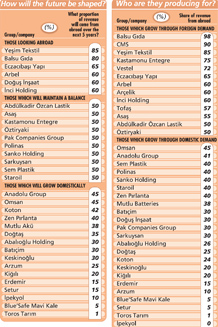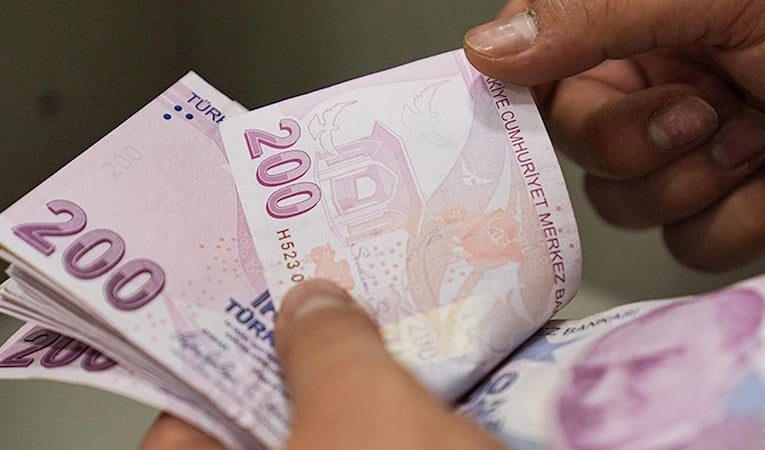- Anasayfa
- Haberler
- Tüm Haberler
- New targets in production
New targets in production
So, should companies in Turkey take the domestic or foreign market as a basis for production?
1.06.2013 00:00:000

Akfen Holding Chair Hamdi Akın says: “We don’t need to stay local.” He believes that companies should produce for foreign markets. Sanko Holding Board Chair Abdulkadir Konukoglu favors a balanced distribution. Bosses such as Ali Abalıoğlu, Ali Kibar and Vahap Küçük think that companies should first conquer the domestic market. The fact that so many foreigners have been drawn to Turkey by the dynamism of the domestic market makes the debate more heated. So, should companies in Turkey take the domestic or foreign market as a basis for production?
Click image to see the table.
 THOSE WHO BELIEVE IN CROSSING BORDERS
THOSE WHO BELIEVE IN CROSSING BORDERS
“We don’t need to remain local. We should be completely international. When people talk about the new generation what come to mind are people who have an international location and produce for foreign markets, Companies should include producing for foreign markets in their founding charter. If not, you will end up shouting ‘We have the best apples and tomatoes’...”
As can be understood from these words, Akfen Holding Board Chair Hamdi Akin sees growth as lying on the other side of Turkey’s borders. He believes that companies in Turkey should produce according to demand and developments abroad. Mutlu Batteries Board Chair Ali Nuri Türker agrees with Hamdi Akin. He argues that goods and services must be able to be consumed anywhere in the world.
İnoksan Board Chair Vehbi Varlık says: “We have witnessed how companies which stay local merely tread water while those who produce for foreign markets record rapid growth. Those who produce mostly for the foreign market are always one step ahead.”
THOSE WHO ADVOCATE THE DOMESTIC MARKET
On the other hand, there are those who draw attention to the potential of the domestic market. Many bosses insist that one needs to focus on Turkey. Abalıoğlu Holding Board Chair Ali Abalıoğlu highlights the country’s rapid development and notes that it has become a very attractive market for the entire world. He says that for this reason the merciless conditions of global competition also apply on the domestic market and that it is a market which one should never take lightly. Some bosses maintain that first conquering the domestic market is a prerequisite for success. LC Waikiki Board Chair Vahap Küçük argues that a company must definitely focus on the domestic market and be successful there.
Küçük says that those companies which have not been successfully domestically and have not achieved a certain size will find it very difficult to be successful abroad. “We only decided to take our leadership abroad after we had achieved a certain size on the market. We are aiming to be one of the three most successful clothing companies in Europe,” he says.~
Kibar Holding Deputy Board Chair Ali Kibar thinks that one should look at the sector before deciding who one should produce for. “If the production sector requires economies of scale then it should be structured in accordance with international competition,” says Kibar. “For example, in transportation, bulky goods should be indexed to local production.” name to brand name products. “This is a great opportunity for brand name furniture producers,” he says. Tepe Home Board Chair İlhan İl notes that the developments in the housing sector in recent years and the urban renewal project mean that the sector has considerable growth potential. Erdemir cites similar reasons and the rise in the rate of urbanization for its forecast that domestic demand for steel will increase. Erdemir officials say: “Over the years ahead, Turkey will be one of the most important countries in terms of the increase in steel consumption.”
LOOK OUT FOR GLOBAL OPPORTUNITIES
On the other hand, several companies in the Turkey’s giants’ league are producing mainly for foreign markets. Many groups and companies in different sectors, such as Arçelik, Vestel, Tofaş, Eczacıbaşı Yapı, the Arbel Group, CMC, Kastamonu Entegre, Balsu Gıda and Yeşim Tekstil sell more than 50 percent of their output to foreign markets, This strategy is based on the fact that foreign markets have more attractive profits and
potential for growth. Some companies turn abroad because they cannot grow any more domestically. Another factor driving production for foreign markets is the desire to spread risks,
Arbel Managing Director Mahmut Arslan says that today they acquire 60 percent of their revenue from abroad. Arslan explains that the reason they initially looked abroad was the high inflation in Turkey, adding that today, even though conditions have changed, it is still more profitable for them to sell products to foreign markets.
Click image to see the table.
 THOSE WHO BELIEVE IN CROSSING BORDERS
THOSE WHO BELIEVE IN CROSSING BORDERS“We don’t need to remain local. We should be completely international. When people talk about the new generation what come to mind are people who have an international location and produce for foreign markets, Companies should include producing for foreign markets in their founding charter. If not, you will end up shouting ‘We have the best apples and tomatoes’...”
As can be understood from these words, Akfen Holding Board Chair Hamdi Akin sees growth as lying on the other side of Turkey’s borders. He believes that companies in Turkey should produce according to demand and developments abroad. Mutlu Batteries Board Chair Ali Nuri Türker agrees with Hamdi Akin. He argues that goods and services must be able to be consumed anywhere in the world.
İnoksan Board Chair Vehbi Varlık says: “We have witnessed how companies which stay local merely tread water while those who produce for foreign markets record rapid growth. Those who produce mostly for the foreign market are always one step ahead.”
THOSE WHO ADVOCATE THE DOMESTIC MARKET
On the other hand, there are those who draw attention to the potential of the domestic market. Many bosses insist that one needs to focus on Turkey. Abalıoğlu Holding Board Chair Ali Abalıoğlu highlights the country’s rapid development and notes that it has become a very attractive market for the entire world. He says that for this reason the merciless conditions of global competition also apply on the domestic market and that it is a market which one should never take lightly. Some bosses maintain that first conquering the domestic market is a prerequisite for success. LC Waikiki Board Chair Vahap Küçük argues that a company must definitely focus on the domestic market and be successful there.
Küçük says that those companies which have not been successfully domestically and have not achieved a certain size will find it very difficult to be successful abroad. “We only decided to take our leadership abroad after we had achieved a certain size on the market. We are aiming to be one of the three most successful clothing companies in Europe,” he says.~
Kibar Holding Deputy Board Chair Ali Kibar thinks that one should look at the sector before deciding who one should produce for. “If the production sector requires economies of scale then it should be structured in accordance with international competition,” says Kibar. “For example, in transportation, bulky goods should be indexed to local production.” name to brand name products. “This is a great opportunity for brand name furniture producers,” he says. Tepe Home Board Chair İlhan İl notes that the developments in the housing sector in recent years and the urban renewal project mean that the sector has considerable growth potential. Erdemir cites similar reasons and the rise in the rate of urbanization for its forecast that domestic demand for steel will increase. Erdemir officials say: “Over the years ahead, Turkey will be one of the most important countries in terms of the increase in steel consumption.”
LOOK OUT FOR GLOBAL OPPORTUNITIES
On the other hand, several companies in the Turkey’s giants’ league are producing mainly for foreign markets. Many groups and companies in different sectors, such as Arçelik, Vestel, Tofaş, Eczacıbaşı Yapı, the Arbel Group, CMC, Kastamonu Entegre, Balsu Gıda and Yeşim Tekstil sell more than 50 percent of their output to foreign markets, This strategy is based on the fact that foreign markets have more attractive profits and
potential for growth. Some companies turn abroad because they cannot grow any more domestically. Another factor driving production for foreign markets is the desire to spread risks,
Arbel Managing Director Mahmut Arslan says that today they acquire 60 percent of their revenue from abroad. Arslan explains that the reason they initially looked abroad was the high inflation in Turkey, adding that today, even though conditions have changed, it is still more profitable for them to sell products to foreign markets.
Türkiye ve dünya ekonomisine yön veren gelişmeleri yorulmadan takip edebilmek için her yeni güne haber bültenimiz “Sabah Kahvesi” ile başlamak ister misiniz?




